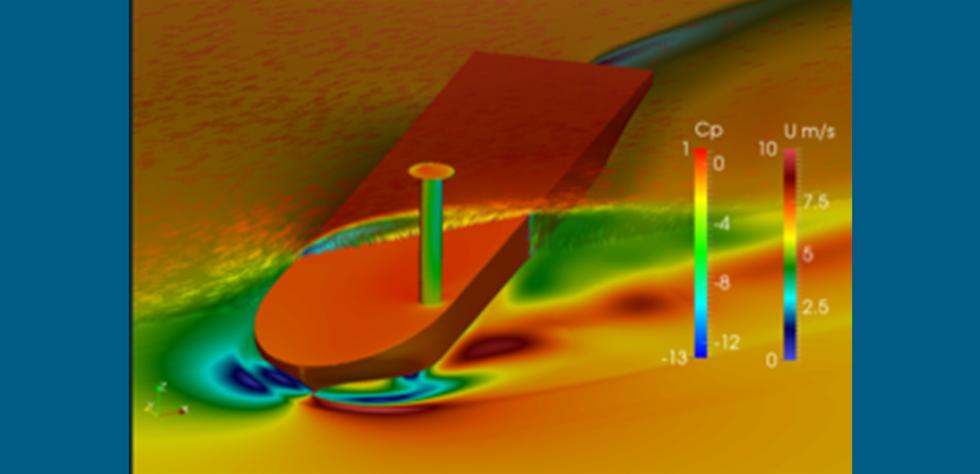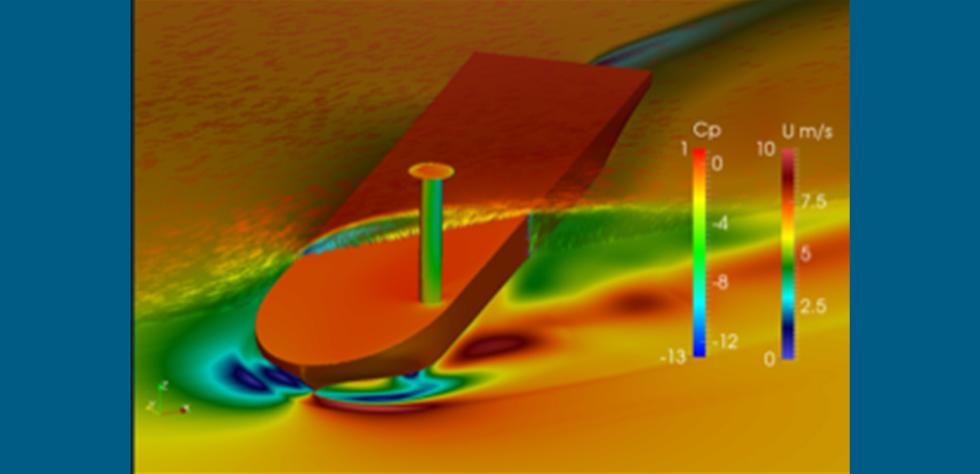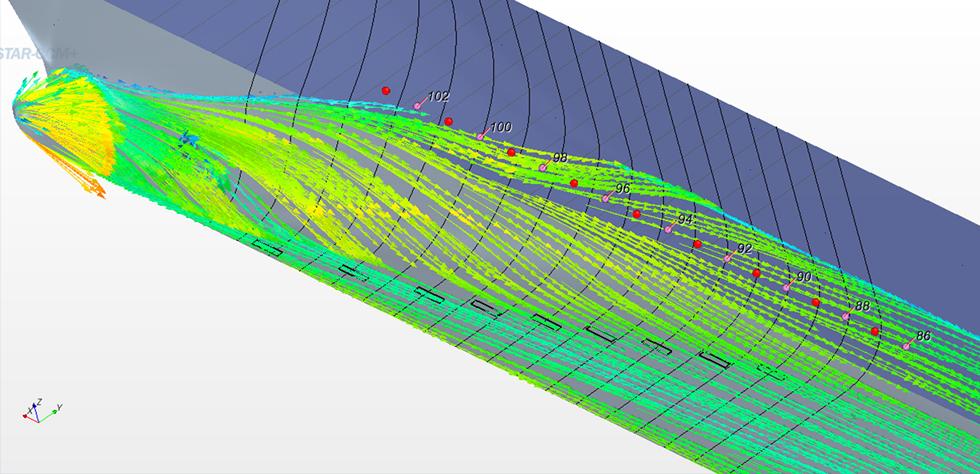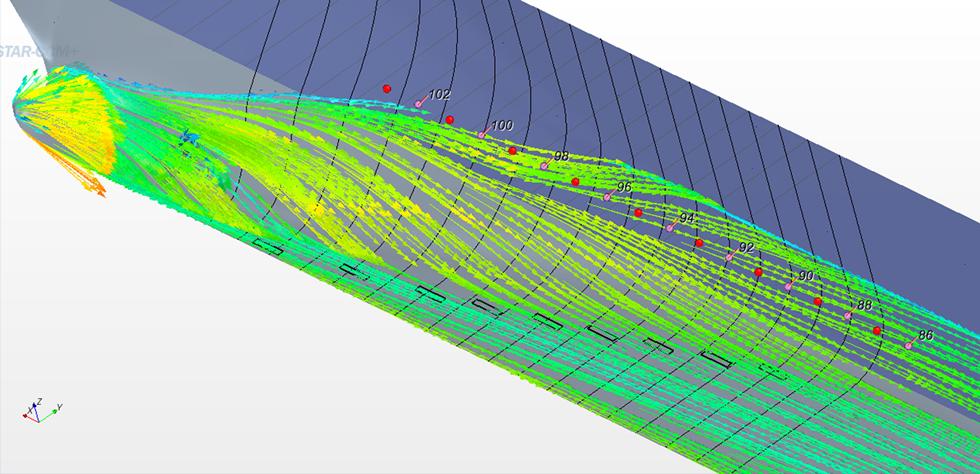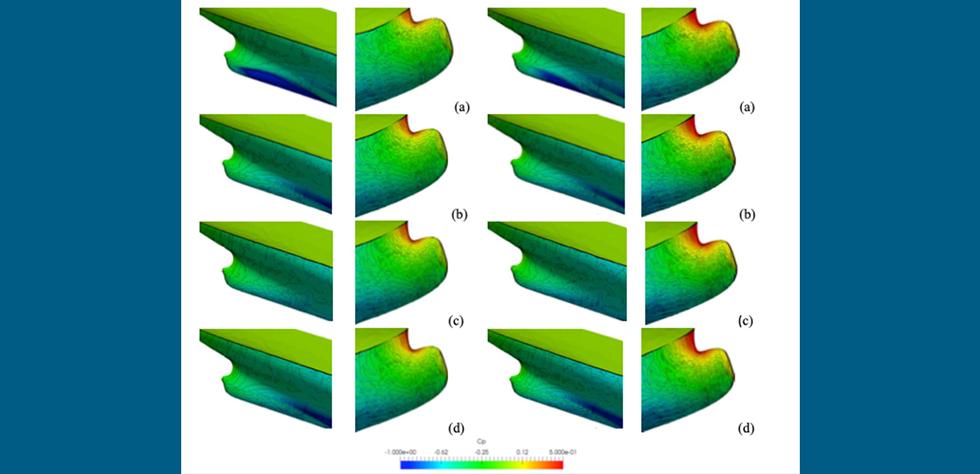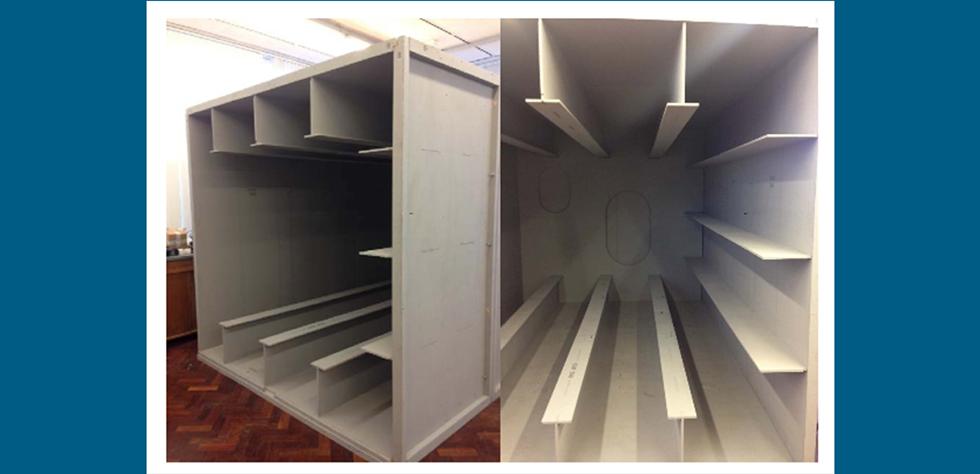Who we are
Research
Opportunities
Education
News and Events
Get in touch
The Centre for Maritime Futures is hosted by the Faculty of Engineering and Physical Sciences. We work closely with Shell Shipping and Maritime, industry partners and policymakers to address the challenges facing the global shipping sector.
The Centre for Maritime Future Leadership team consists of:
Jo Donahoe
Nikki Matthews
The Steering Group advises the leadership team and includes representation from Shell, currently:
Carl Henrickson, General Manager Shipping and Maritime Value, Shell Shipping and Maritime
Stephen Brown, Manager, Technology, Innovation and Decarbonisation, Shell Shipping and Maritime
Catherine Price, Manager, External Research and Innovation.
Related academic staff members:
PhD students:
Charlie McKinlay
Amy Parkes
Harry Way
Fangsheng Ge
The research of the Centre for Maritime Futures addresses four key themes.
De-Carbonisation
Efficiency
Safety
Digitalisation
You can find out more about each of the themes by clicking the tabs below.
De-Carbonisation
In 2018 the International Maritime Organisation, which is the United Nations specialized agency with responsibility for the safety and security of shipping and the prevention of marine and atmospheric pollution by ships, set a goal for reducing the absolute atmospheric CO2 emissions of global shipping by 50% by 2050 compared to 2008 levels. Accounting for likely increases in world trade this will require an approximate decrease in CO2 intensity of 85%.
This theme leads research into future fuels in shipping and in harnessing the potential to capture and utilise Carbon.
Future Fuels
Hydrogen offers the prospect of a fuel without release of greenhouse gas emissions if it is produced using renewable energy sources. Hydrogen – and alternatives that are essentially Hydrogen carriers, such as Ammonia – may be combined with all-electric ship concepts likely to incorporate energy-storage onboard and thus requiring hybrid operations. Key to the adoption of any future fuel and/or technology at scale across shipping will be the supply of the fuel – including its production using renewable energy hence its likely global distribution, economics of production and supply as well as the level of change and acceptance (‘pathway’) required to integrate the fuel or technology into ships, both ocean-going and coastal. A transition to future propulsion solutions requires systems to be designed and their feasibility tested.
An integrated systems engineering approach including considerations of safety, environmental, technical, operational, supply and economic aspects is being adopted. This integrates expertise across the University in ship design, chemistry, materials characterisation at cryogenic temperatures/under pressure and hybrid-systems modelling. Work towards alternative ship designs and layouts will be underpinned and evaluated using data gathered from real ship operations, trading routes and weather conditions.
This theme is led in conjunction with the Energy Technology Group within the Faculty of Engineering and Physical Sciences (FEPS), with expertise in combustion technology and modelling (including using Hydrogen and other fuels), fuel cells and electrochemistry, Carbon Capture and Storage technologies, hybrid energy technologies and materials testing and characterisation at liquid Hydrogen temperatures. Within FEPS the High-voltage laboratory has expertise in electric machines, energy storage and cabling materials.
The University partners with Siemens rail in investigating applications of Hydrogen and National Grid in energy storage and smart grid optimisation and energy storage.
The University of Southampton is a member and theme leader in the new £2M UK Research and Innovation (UKRI) network in ‘Decarbonising the UK’s freight network’, bringing further connectivity to over forty academic and industrial partners.
Ongoing projects:
Comparison of Hydrogen and Ammonia for Shipping fuels
A comparison of the merits of Hydrogen, Ammonia and Methanol as potential future fuels for global shipping. This research is comparing the technical feasibility of each fuel in terms of onboard systems, volumetric and mass storage requirements and loading/unloading requirements. A detailed investigation into auxiliary power demands and system power management, underpinned by data from real ship operations, is being conducted to assess the feasibility of initial deployments of fuel cells at sea. This research is supported by the Energy Systems Centre for Doctoral Training and is a collaboration between Maritime Engineering and the Energy Technology Group within the Faculty of Engineering and Physical Sciences. One of the investigators, Professor Stephen Turnock, is an invited member of the International Energy Agency Hydrogen Implementing Agreement Task 39, Hydrogen in Marine Applications group. Additionally, the University is a partner in the UK Energy Research Centre’s Whole Systems Network Fund Hydrogen Project.
Paper entitled ‘A Comparison of Hydrogen and Ammonia for Future Long-Distance Shipping Fuels’ presented at RINA Conference on LNG/LPG and Alternative Fuel Ships in London, January 2020.
Containment systems for liquid Hydrogen
A pilot study into the use ofo stainless steel for containment of liquid Hydrogen, encompassing a review of the legal and regulatory framework for the use of Hydrogen as a marine fuel and development of pioneering materials testing capability at liquid Hydrogen temperatures. This project is a collaboration with Lloyd’s Register and involves a multi-disciplinary team from Maritime and Civil Engineering and the Institute of Maritime Law at the University.
Carbon Capture Storage and Utilisation
A multi-disciplinary approach to the challenge of addressing net-zero Carbon emissions is represented by the University’s Clean Carbon strategic research group. With expertise from all Faculties of the University this group encompasses research into technologies, policy, economic and legal aspects of de-Carbonisation. This includes research in Carbon Capture Storage and Utilisation (CCSU), whether using depleted oil and gas reservoirs, biological systems or other geological formations. Projects to decrease the size of CCS units have the potential to enable their use onboard large merchant ships. An initial study has investigated the feasibility of onboard units to capture exhaust emissions for the production of Methanol for a mid-sized oil tanker.
Efficiency
The International Maritime Organisation goals for reduction in shipping CO2 emissions require a 40% reduction in CO2 intensity by 2030 as compared to 2008. With the realistic prospect of future fuels being more distant, this reduction will need to be achieved through improving the energy efficiency of existing vessels and those built in the next few years. In the longer term, as shipping moves to de-Carbonise, continued reduction of the energy requirements of ships results in less demand for any future fuel.
This theme will continue work into the efficiency of shipping that has been conducted at the University of Southampton for over 30 years and supported by Shell Shipping and Maritime for over a decade.
There are continual developments in technology to reduce fuel consumption and emissions from shipping. These include novel coatings and propeller technologies as well as devices to alter flow behaviour around ships. Key to optimising the design of any device, or ship to use a device, is understanding the complex and unsteady flow regime around a vessel in its actual operational environment (waves, wind) and across varying operational conditions (speed, draught, trim) rather than in calm water at one, so-called, ‘design speed’. New hydrodynamic facilities, such as the 138m towing tank at the University’s Boldrewood campus, the largest such facility in the UK equipped with detailed motion and flow measurement capability, together with advanced computational fluid dynamics techniques using the UoS Iridis 5 supercomputer are essential to gain this understanding and design ships of the future.
Work in this theme focuses on improvements to both ship design and operation and encompasses study into new technologies as well as fundamental understanding of unsteady hydrodynamics.
Modelling hull, propeller and rudder interaction
Understanding the complex unsteady flow around a ship’s hull, propeller and rudder is key to designing them as a complete system and to thus increasing their combined efficiencies. This PhD project developed and demonstrated new computational fluid dynamic (CFD) modelling tools for the simulation of these complex flows.
Draught and trim optimisation using machine learning
It is increasingly common for vessels at sea to record data continuously, including the propulsive (shaft) power together with operational parameters such as speed, draught and trim and environmental parameters such as wind speed and direction. Using these data to understand the influence of these parameters on the propulsive power is challenging using traditional methods due to the stochastic nature of the data and the interaction between the parameters. This project has developed machine learning techniques to predict shaft power within an accuracy of 2%. Such a level of prediction accuracy has enabled these techniques to be incorporated into a system to optimise a vessel’s draught and trim to reduce emissions. The system has now been deployed for >60 ships and resulted in fuel savings of 3-7%, depending on the vessel. This saved >250000 tonnes of CO2 in 2019.
"Physics-based shaft power prediction for large merchant ships using neural networks"
Further understanding of the physical causes of these changes in power with small changes in draught and trim is provided through use of computational fluid dynamics (CFD) techniques to study the flow around the vessel. The figure illustrates bow and stern flow details for a tanker with small changes in draught and trim travelling at a Froude number of 0.162 (left) and 0.174 (right) for displacements of (a) 100% (b) 106% (c) 109% (d) 112%.
Predicting power for fleets of merchant vessels
Recognising that measuring detailed parameters onboard all vessels is not viable, particularly for older vessels or for vessels under Charter, rather than Owned, this project is working to develop machine learning tools capable of fusing data from vessels where data are recorded to predict the shaft power requirements for vessels without the same level of measurements. This project has demonstrated that prediction of power for Sister ships within a fleet can achieve an accuracy of 4%. This accuracy is sufficient for some fuel-saving applications and will be deployed in the near future.
Air lubrication systems
One of the few technologies capable of reducing a vessel’s power requirement by more than a small percentage is air lubrication. These systems create bubbles in the boundary layer of the ship’s hull, reducing the frictional resistance (drag) of the ship. For most slow-speed merchant ships the frictional resistance is more than 70% of the total resistance and hence power requirement.
The University have support Shell Shipping and Maritime’s studies into air lubrication systems through the use of computational fluid dynamics (CFD) modelling of a vessel to investigate the placement of air release units and in the independent verification of analysed power savings from initial test deployments of an air lubrication system. Shell Shipping and Maritime intend to retrofit air lubrication systems to Liquefied Natural Gas (LNG) carriers in 2020.
Wind-assist technology
Auxiliary propulsion devices to take advantage of the wind have the capability to reduce the power required by a ship significantly, clearly depending on the wind encountered by the vessel. A study into one such device type, Flettner rotors, was conducted in association with the University’s Wolfson Unit for Marine Technology and Industrial Aerodynamics (WUMTIA). This study combined Computational Fluid Dynamics (CFD) modelling using the University supercomputer with the WUMTIA’s expertise in predicting the performance of sailing vessels using a purposely modified version of its Velocity Prediction Programme. The study investigated the application of Flettner rotors to both oil and liquefied natural gas carriers and focused in particular on the interaction effects between multiple rotors and between the ship’s hull, superstructure and Flettner rotors.
A summary of the work was published in a conference paper, ‘Predicted fuel savings for a Flettner Rotor assisted tanker using computational fluid dynamics’ at the RINA Wind Propulsion 2019 Conference in London in October 2019.
Hull and propeller fouling management
Marine fouling and growth on a ship’s hull increase its power requirement and hence fuel consumption. Despite improvements in coating technologies these increases can be significant over the typical 5-year dry-docking periods of merchant vessels. How a vessel is operated influences the rate of fouling, with slower speeds, warmer waters, time in port and lower salinity all causing increases. It is therefore imperative for vessel operators to monitor fouling, to assess effectiveness of coating schemes and to plan cleaning and/or re-coating. Ship’s propellers are not always coated and will also foul with time, therefore also requiring cleaning.
Whilst measurement of ship propulsive (shaft) power is now relative common, it is extremely rare to measure propeller thrust directly. Without propeller thrust measurements, it is impossible to separately monitor hull and propeller fouling directly. This study utilised understanding of vessel powering and efficiency to devise a practical method to separate hull and propeller fouling and thus allow their development to be monitored independent of each other. This method has now been deployed within Shell Shipping and Maritime and allows more accurately targeted interventions to optimise vessel cleaning.
Economic operational speed of a time-chartered ship
The speed a ship travels is fundamental to its operation and to the fuel it will consume and hence its emissions profile. However, the actual operational speed of ships varies even for similar ship types, sizes and technical characteristics. It is hard to always explain these variations and yet understanding them is of fundamental importance in reducing shipping emissions through legislation, or through changes in ship Chartering agreements, or through changes in operational patterns including reduced port turnarounds.
This project applies an approach based on cash-flow functions and novel to the shipping industry to develop models to better understand how speed decisions are made when using a chartered ship to transport bulk cargo. The models developed exhibit the characteristics and trade-offs experienced decision makers take into account. This gives confidence that such models form an appropriate basis to investigate novel contractual arrangements to reduce ship emissions.
Safety
This theme aligns with Shell Shipping and Maritime’s goal of a future of zero incidents, zero harm, caring for the mental and physical well-being of all its employees. Whilst ship safety has improved in recent decades, seafaring remains a relatively more dangerous occupation compared to equivalent land-based occupations.
Seafarer health and well-being
The University has conducted research aimed at safeguarding those onboard ships for several years, through improved understanding of the behaviour of crew and translation into effective training and guidance.
One particular focus was Project MARTHA, a $3M research project into seafarer fatigue conducted by an international partnership of researchers and industry, sponsored by the TK Foundation, over a three-year period from 2013 to 2016. Project MARTHA was presented to the IMO.
The aim of the study was to explore the levels of sleepiness and the psycho-social issues associated with long term fatigue and motivation of seafarers, using a sample of volunteers in the natural setting of work onboard their vessels. Two PhD students, working beyond Project MARTHA, are now investigating the influence of stress and fatigue on specific aspects of cognitive performance directly relevant to ship operations.
A third recent PhD project investigated the decision-making procedures for a vessel’s shipboard management and the extent to which safety is embedded within them at an organisational level.
An independent review into the causes of serious maritime incidents was conducted on behalf of Shell Shipping and Maritime in 2015. Applying a root cause analysis methodology indicated that human factors error related causal factors were responsible for approximately 90% of incidents.
Feasibility of autonomous ballast tank inspection
The inspection of enclosed spaces onboard ships remains a challenging task, in particular ship’s ballast tanks. Ballast tanks are enclosed spaces surrounding cargo holds, used to trim and stabilise vessels during normal operations and filled by pumping seawater into and out of the spaces during voyages. There is no natural lighting or ventilation to these spaces. Ballast tanks are a hazardous working environment, since work in confined and enclosed spaces has a greater likelihood of causing illness, severe injuries and fatalities than any other type of shipyard work or onboard ships.
This project investigated the feasibility of using an autonomous quadcopter vehicle to undertake a survey of a ship’s ballast tank space. Using a series of prototype platforms and a representative ballast tank space at the University (see figure), this project concluded that it is possible to use a multi-rotor vehicle within a ballast tank space and maintain the distance from the tank structure required for visual inspection purposes, although challenges remain around the size of the vehicle due to access spaces and power consumption of such vehicles for available battery technologies.
Ship structural integrity
Within the overall aim of improving ship safety, research is aimed at moving the shipping industry to a Digital Health Management approach, with real-time diagnostics and prognostics. This requires a better understanding of structures and their behaviour over time, using increasingly accurate experiments combined with modelling of potential failure modes linked to root causes.
This approach will allow i) improved inspection regimes using a risk-based approach to reduce downtime and in-service inspections, allowing a movement away from rigidly imposed inspection cycles, ii) enhanced understanding of long-term relationships between structural response and the environment, providing the means to enhance rules and provide feedback to designers and constructors, iii) improved tools for structural design through combination of measured data and multi-scale, multi-physics computational techniques.
As an initial step towards this aim the University is working with Lloyd’s Register (LR) to investigate the feasibility of applying a ‘Digital Twin’ approach to modelling corrosion onboard ships over time.
Digitalisation
The volume of data acquired from ships and their systems is increasing rapidly, as is the speed of transmission from ship to shore. Sensors may be deployed to monitor numerous internal and external parameters such as energy consumption from distributed electrical loads, environmental parameters and crew activity and sleep patterns. Mobile sensors in the form of drones or robotic systems will acquire data in difficult places. The data collected promises to deliver insights to improve safety and efficiency of vessels, crew, cargo-handling and reduce emissions. Challenges exist in deploying sensor networks on marine platforms where the harsh environment, sporadic communications and infrequent servicing schedules lead to error-prone sensors operating beyond their effectiveness.
Digitalisation is transforming aspects of the shipping industry. Focus areas for the research in the Centre for Maritime Futures include optimising the operations and maintenance of vessels to improve safety and operational efficiency and reduce emissions. The commercial relationships and models within shipping may also be changed by Digitalisation with great potential to decrease the emissions from the global shipping fleet. Digitalisation techniques and modelling are also being applied within the Centre to profile shipping emissions and to investigate the impact of potential future global and regional policy decisions around, say. Carbon taxation.
The Centre for Machine Intelligence (CMI) at the University leads research in this theme, with support from the Centre for Operational Research, Management Sciences and Information Systems (CORMSIS), which is one of the largest groups of its type in the UK and spans Mathematical Sciences and the Southampton Business School. This expertise is being utilised to develop and deploy new methods, with previous projects including the development of pricing systems based on online auction platforms for optimising the charging of electric vehicles and understanding their interactions with the National Grid.
PhD Positions in Centre for Maritime Futures
We have a number of funded PhD positions every year in the areas falling within the Centre for Maritime Futures. These PhD positions are suitable for high quality and ambitious students looking to learn about and develop the next generation of methods and technology in the maritime field. We strongly promote an entrepreneurial spirit among our students and encourage collaborative research.
All PhD students within the Centre for Maritime Futures have the opportunity to spend collaborative placements embedded within Shell Shipping and Maritime.
Current Opportunities
You can find a list of specific PhD positions available below. Some of these may come with full/part funding. Click on the titles for more details and links to the application process.
Machine Learning for Stress and Fatigue Detection in Ship Crews
Design of propeller and propeller-energy efficiency devices for realistic ship operations
Improving ship safety through closing the design loop
Carbon capture and utilisation onboard merchant ships
Design, build and test of a fully composite tank for cryogenic fluids
Internship positions in Centre for Maritime Futures
We have a number of part time internship positions available in the Centre for Maritime Futures and each summer also recruit a number of full-time internship positions. These internship positions are suitable for high quality students currently studying at the University of Southampton.
All internship students within the Centre for Maritime Futures have the opportunity to spend collaborative placements embedded within Shell Shipping and Maritime.
The University offers 25+ courses in the marine area, from engineering to science and law degrees at both under- and post-graduate levels. Our graduates are highly sought after by industry and many have reached top positions in their field. Our course offering continually evolves based on industrial and societal changes.
Our engineering courses in Maritime Engineering are based in the Faculty of Engineering and Physical Sciences, one of the largest engineering faculties in the UK. These courses are all accredited by the Royal Institution of Naval Architects, Institute of Marine Engineering, Science and Technology and the Institution of Mechanical Engineers.
Guest lecturers from Shell Shipping and Maritime contribute to ship design teaching on this programme and form part of the industrial ‘desktop review’ panel for the Marine Craft Concept Design module. Shell Shipping and Maritime provide support for third year undergraduate and postgraduate taught (MSc) research projects and fourth year group design projects.
Since the inaugural Faculty Design Show in 2015 Shell Shipping and Maritime have been on the judging panel for the ‘Excellence in Engineering Design’ award, alongside other strategic industrial partners of the University.
In 2019 Shell Shipping and Maritime sponsored a new award, the Shell Innovation Award.
Also aligned to the work of the Centre for Maritime Futures, the University’s Marine Science degree programmes are based at the unique waterfront campus, co-located with the National Oceanography Centre (NOCS). All Oceanography degrees are accredited by the Institute of Marine Engineering, Science and Technology.
Founded in 1982, the Institute of Maritime Law at the University run a variety of courses and seminars and advise a large number of corporations and law firms on aspects of maritime law. The Southampton Law School offer an LLM in Maritime Law.
Events
Alan Turing Institute @ Southampton event
The Centre for Machine Intelligence Showcase 2019
Centre for Maritime Futures – signing, press release and photos
Design Show – Shell Innovation award
News
Expanding impact of machine learning solution reduces emissions in maritime shipping
Corporate finance modelling re-applied to accelerate decarbonisation in shipping
Knowledge transfer partnership launched to build on PhD research undertaken in the Centre
PhD student Amy Parkes’ research impact
PhD student Charlie McKinlay contributes to Hydrogen UK Parliament Inquiry
You can email us at the Centre for Maritime Futures
Or call us on +44 (0) 23 8059 2306
Our physical address is:
Centre for Maritime Futures
3007, Building 176
University of Southampton
Southampton
SO16 7QF
United Kingdom
How to get here?
(link to Boldrewood campus page/directions)
